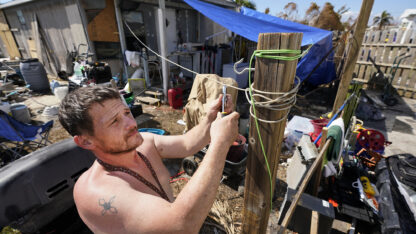Paying for mental health care leaves families in debt and isolated

Rachel and her husband adopted Marcus out of Guatemalan foster care as a 7-month-old infant and brought him home to Lansing, Mich. With a round face framed by a full head of dark hair, Marcus was giggly and verbal — learning names of sea animals off flashcards, impressing other adults.
But in preschool, Marcus began resisting school, throwing himself on the ground, or pretending to be sick — refusals that got more intense and difficult to deal with. His parents sought therapy for him. Rachel and her husband had some savings for retirement, college and emergencies; at first, the cost of Marcus’s therapy was not an issue. “We didn’t realize where it was going,” Rachel says.
Today Marcus is 15 and has a younger sibling. His parents have depleted their savings and gone into debt to pay for treatments for his severe depression, anxiety and mood disorders. Frequently agitated and increasingly violent, Marcus could not attend a regular school. Over the years, he’s needed weekly therapy, hospitalization and specialized schooling — all of which has cost tens of thousands of dollars a month.
He required lots of medical and mental health appointments that were often many miles from the family’s home. Rachel ultimately quit her real estate broker’s job to care for her son, and with that the family took another financial hit. With no good treatment options within hours of where they live, Marcus is now in residential care out of state that specializes in therapy for children with conditions like his. That’s helped modulate his behavior, but also costs $12,500 a month.
“All of our savings is gone,” says Rachel, who requested anonymity to protect her son’s privacy. She and her husband have taken out a second mortgage and borrowed against their retirement accounts.
“How are we going to send our kids to school?” she says. “How are we going to recover from this? I don’t know.” Just surviving the string of crises is all-consuming. “Those thoughts in your mind — there’s no space for that when you are just trying to keep your child alive.”
Untold numbers of families like Rachel’s are dealing with myriad challenges finding and paying for mental health care, and then ending up in debt. There are too few therapists and psychologists in the U.S. — and fewer still who provide treatment paid for by insurance. That compounds the financial toll on families.
Tabulating the impact isn’t easy. Many do what Rachel did: They refinance their house, drain college savings or borrow from family. But that kind of borrowing often isn’t included in estimates of medical debt. As a result, it’s been hard to know how much families are paying out of their pockets for mental health treatment.
A recent KFF poll designed to measure the many ways people borrow to pay medical bills found that about 100 million Americans currently have some kind of health care debt, and 20% of those owe money for mental health services.
Those who can’t afford to borrow sometimes try to get coverage for their children under public insurance like Medicaid, which sometimes means reducing their income to qualify.
When even Medicaid isn’t always a safety net
After her workplace health insurance denied coverage for her 9-year-old daughter, Colleen O’Donnell, a single mom from Providence, R.I., stopped working, so her income would fall below Medicaid’s limit. O’Donnell, a registered nurse, could have made lots of bonus pay caring for COVID patients. Instead, she says, she needed to stay home to care for her daughter, who suffers from, among other things, disruptive mood dysregulation disorder — a condition that goes far beyond normal tween moodiness. Treatment didn’t require just medication or visits to the doctor or hospital; the girl needed wrap-around therapy that included in-home care. The child’s unpredictable moods and violent tantrums made it impossible to send her to school, or for her mother to hire a sitter to care for her.
“Qualifying for Medicaid means essentially you’re living right around the poverty level, which means I’m not generating any sort of wealth, I’m not saving for retirement or anything like that,” says O’Donnell. She took on a second mortgage for $22,000. She estimates at least $60,000 in lost wages a year. But staying home with her child was still worth it, she says, because the private health insurance she’d been receiving through her job didn’t pay for her daughter’s care.
Some desperate families go to even more extreme lengths to get mental health care covered by Medicaid. Some leave their children at hospitals, relinquishing custody, so the children become wards of the state. Others simply forgo care altogether.
So how much is this costing families across America? And how many are forgoing care? It’s hard to know.
Lack of data keeps struggling families in the shadows
“We don’t have real data,” says Patrick Kennedy, a former U.S. congressman and founder of the Kennedy Forum, a mental health advocacy group. Across the board, he says, there’s a lamentable lack of data when it comes to mental illness. “We don’t track this, we have a hodge-podge of reporting that’s not standardized.”
That lack of data keeps many people in the shadows, Kennedy says. It makes it hard to hold insurers accountable for any legal obligations they have to pay for mental health care, or to argue for specific policy changes from regulators that oversee them. Kennedy says that problem should not fall on the shoulders of the many families who are too busy fighting to survive.
“If you’re a family or someone who has one of these illnesses, you don’t have the capacity for self-advocacy, right? And shame still factors in, in a large way,” he says.
Rachel, the mother in Lansing, estimates Marcus’s treatment costs topped a quarter million dollars over the past two years alone. Nearly all of that, Rachel says, was driven by care their insurance company declined to cover.
Over the years, Marcus underwent numerous neuropsychological tests, checking everything from intelligence and personality to trauma and motor skills to gauge the gaps in how he perceives the world. Each test cost several thousand dollars. Weekly therapy cost $120. Special schools, including a wilderness therapy program, cost thousands of dollars a month, and Rachel says insurance covered almost none of it.
The health insurer cited various reasons: The wilderness therapy, even if it worked, was deemed too experimental. Other treatments weren’t in-network. Even when Marcus became increasingly violent and a danger to himself and others, insurance agents repeatedly told Rachel that various types of inpatient or residential treatment programs and specialists recommended to her weren’t covered because they were “not medically necessary,” or would require reauthorization within days.
Meanwhile, Marcus’ problems at home were escalating. “There were times that I hid,” Rachel says, voice breaking. “I found hiding places so that my kid couldn’t find me. He would hurt me. He would attack me, throw things at me, push me.”
Faced with this do-or-die situation, Rachel and her husband decided to pay the costs of the care themselves and fight it out with insurance and lawyers, later. For the past year, they’ve spent $150,000 to send Marcus to an out-of-state therapeutic school that specializes in teaching children with behavioral disorders.
What ever happened to ‘mental health parity’ in reimbursement?
That growing reliance on out-of-network care for mental health treatment is also a national trend, despite various federal and state laws requiring insurers to cover services like addiction treatment, for example, on par with CT scans, surgeries, or cancer treatments. A 2019 report commissioned by the Mental Health Treatment and Research Institute found those disparities getting markedly worse, especially among children, between 2013 and 2017 —– effectively forcing more patients to seek behavioral health care outside of their insurer’s networks.
The tradegroup America’s Health Insurance Plans, or AHIP, says the industry is compliant with existing laws and is working to expand options to meet increased demand for mental health care.
“Given the workforce and capacity shortages in [mental health and substance use disorder] care, it’s important that patients receive the appropriate level of care, helping to preserve higher levels of care for those who need it most,” David Allen, a spokesman for AHIP said in an emailed statement. He says insurers are taking measures like adding new providers to their networks, and adding telehealth options to expand their reach into places like schools and family physicians’ offices. But, he says, not every kind of care should qualify for coverage. “It is important to make sure that people receive high-quality care based on scientific evidence.”
Regulators have been slow to police insurers for improper ‘denial of coverage’
But Deborah Steinberg, a health policy lawyer at the Legal Action Center, which advocates for consumers, says insurers improperly deny coverage for appropriate treatments far too often. Few consumers know how to determine that, and end up paying the bill.
“They are actually not necessarily bills [patients and families] should be paying, because a lot of the time these are illegal practices,” Steinberg says. “There are so many complicated laws here that people don’t understand. And when people pay the bills or take it out as credit card debt, they’re not challenging those practices.”
Nor have regulators been aggressive in policing insurers, or fining them for violations.
That’s something Ali Khawar pledges to change. Khawar, an acting assistant secretary at the Labor Department’s Employee Benefits Security Administration, which oversees private insurers, says his agency’s report to Congress earlier this year showed high levels of violations. The report also showed the insurance industry failing to keep adequate data on their compliance with parity laws.
But, Khawar says, coverage of mental health care is a problem he keeps hearing about in all corners of his life, and the fact so many families are struggling has made this a top priority for his agency. “There is a level of attention, a level of resources being put to these issues that is kind of unprecedented,” he says.
Often, it falls to attorneys general to enforce insurance rules, and the willingness and resources available to do so varies by state.
In Michigan, where attorney J.J. Conway practices, the state has not been active in investigating the industry, he said. So families must seek recourse on their own, he says, if they want to dispute denial of coverage with their insurer. Conway, who represents Rachel’s family and many other parents, says he’s seeing the biggest surge in mental health disputes in his 25 years as a lawyer.
Conway says there’s a strange silver lining in the sheer number of families now struggling to get mental health coverage. The cases are so numerous, he says, he hopes collectively they’ll eventually be able to force a change.
This story is part of Diagnosis: Debt, a reporting partnership between KHN and NPR exploring the scale, impact and causes of medical debt in America. KHN (Kaiser Health News) is an editorially independent, nationwide program of KFF (the Kaiser Family Foundation).
9(MDAxODM0MDY4MDEyMTY4NDA3MzI3YjkzMw004))








